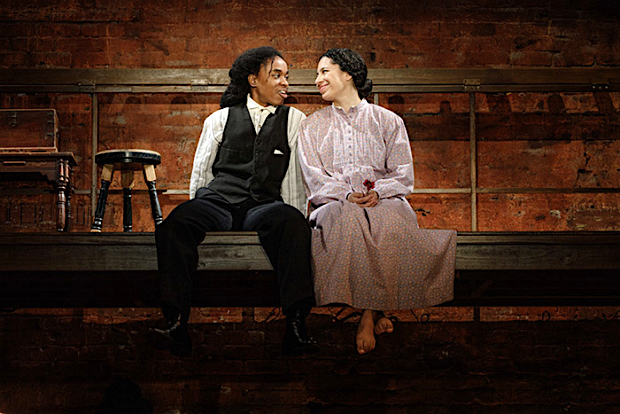
“Were art to redeem man, it could do so only by saving him from the seriousness of life and restoring him to an unexpected boyishness.”
José Ortega y Gasset, “Art a Thing of No Consequence”
Terry Teachout on the arts in New York City

“Were art to redeem man, it could do so only by saving him from the seriousness of life and restoring him to an unexpected boyishness.”
José Ortega y Gasset, “Art a Thing of No Consequence”

Mrs. T’s discharge was a wholly unexpected development that caught us both off guard, so much so that I had to spend all of Friday scrambling to get her back home. On the other hand, there was no longer any reason for her to remain in the hospital, which is not an easy place to sleep, so it was clearly for the best that she be sprung as soon as was practical. Fortunately, she’s now recovered sufficiently to be able to use home oxygen instead of the high-flow hospital-only kind.
So why is Mrs. T in Connecticut instead of our apartment in Upper Manhattan, a stone’s throw from the hospital? For bureaucratic reasons too labyrinthine to summarize intelligibly, she has to receive her outpatient antibiotic infusions there. In addition, she must also pay a number of visits to the University of Connecticut Health Center (where her pulmonary-hypertension doctors are based—New York-Presbyterian is the home of her transplant team). Once the infusions are complete and her UConn appointments wrapped up, though, she’ll return to New York—preferably not by helicopter—and sit tight until we finally get the Big Call.
Alas, I’d already locked in a long list of work-related travel plans when we found out that Mrs. T was going home on Friday (we’d previously had good reason to expect her to be staying in New York indefinitely). As a result, I had to drive back to New York on Saturday night and spend Sunday and Monday reviewing an off-Broadway show and getting ready to hit the road yet again, while Mrs. T’s father and nephew looked after her in Connecticut.

This “break” turned out to be timely, though, because I’m far beyond exhausted: I’ve been on near-nonstop duty ever since I called an ambulance for Mrs. T on June 8, and I’ve never been so tired in my life. That’s why I’m going to depart New York later today for a caregiver’s holiday, something of which I am in urgent need, after which I’ll return to New York and get back to work. I’ll tell you more about where I’m going once I get there. Then I’ll pay my annual visit to the Hudson Valley Shakespeare Festival, from which I return to Connecticut on July 6, there to start preparations for the complicated process of moving us back to Manhattan.
Mrs. T wants you to know that she has been keeping up with your warm messages of support here and elsewhere. She doesn’t yet have the steam to respond to them, but please believe me when I tell you that she is grateful beyond words—literally—to know how many of you care so much.
From 2009:

Read the whole thing here.The big news, if you want to call it that, is that the Tonys are now a local story rather than a national one. Scarcely anyone outside New York City watches the telecast. And the ceremony itself is mainly about musicals, which in certain seasons has been understandable, but definitely not this time around. Moreover, the Tonys themselves are about Broadway, which means that the most important new play of the season, Lynn Nottage’s Ruined, and the best straight-play revival to open in New York, David Cromer’s Our Town, both went unmentioned at last night’s ceremony….

“In music, the punctuation is absolutely strict, the bars and rests are absolutely defined. But our punctuation cannot be quite strict, because we have to relate it to the audience. In other words, we are continually changing the score.”
Ralph Richardson, interviewed by Kenneth Tynan (The Observer, December 18, 1977)

“A Conversation with Marcel Duchamp,” an episode of NBC’s Wisdom originally telecast on January 15, 1956. The artist is interviewed by James Johnson Sweeney:
(This is the latest in a series of arts- and history-related videos that appear in this space each Monday, Wednesday, and Friday)

“Modern art reflects the disequilibrium of modern society in that it so often springs from a blind passion vainly seeking to sate itself in form, color, or sound. An artist can contemplate sensual beauty only when he loves all that surrounds him on earth. But if all he feels is loathing at the discrepancy between what he would wish the world to be and what it is in reality, then he is incapable of standing still and beholding. He is ashamed of reflexes of love; he is condemned to perpetual motion, to a restless sketching of discontinued, broken observations of nature. Like a sleep-walker, he loses his balance as soon as he stops moving.”
Czesław Miłosz, The Captive Mind
* * *

Kate Hamill has made a name for herself by writing ingeniously wrought stage versions of popular 19th-century novels that treat their source material with mischievous freedom….In taking on “Little Women,” though, she’s drawing to an inside straight: Not only is Louisa May Alcott’s 1869 novel about the four March sisters and their journey to adulthood one of the most beloved of all children’s books, but it’s been adapted countless times for both stage and screen, most famously and successfully by George Cukor in 1933, with yet another version, written and directed by Greta Gerwig, set for big-screen release in December. As clever as Ms. Hamill is, what new wrinkle can she bring to so familiar a tale?
The answer is that in this “Little Women,“ directed with fizzy energy by Sarna Lapine, Jo (played by Kristolyn Lloyd) is more sexually equivocal than the old-fashioned “tomboy” of the novel….
* * *
Read the whole thing here.The trailer for Little Women:
An excerpt from the 1933 screen version of Little Women, directed by George Cukor and starring Katharine Hepburn and Douglass Montgomery:

Betty Comden and Adolph Green appear as the mystery guests on What’s My Line? The panel includes Phyllis Newman, Green’s wife. The mystery-guest segment begins at 12:01. John Daly is the host and the other panelists are Bennett Cerf, Arlene Francis, and Kevin McCarthy. This episode was originally telecast by CBS on July 2, 1967:
(This is the latest in a series of arts- and history-related videos that appear in this space each Monday, Wednesday, and Friday)
An ArtsJournal Blog